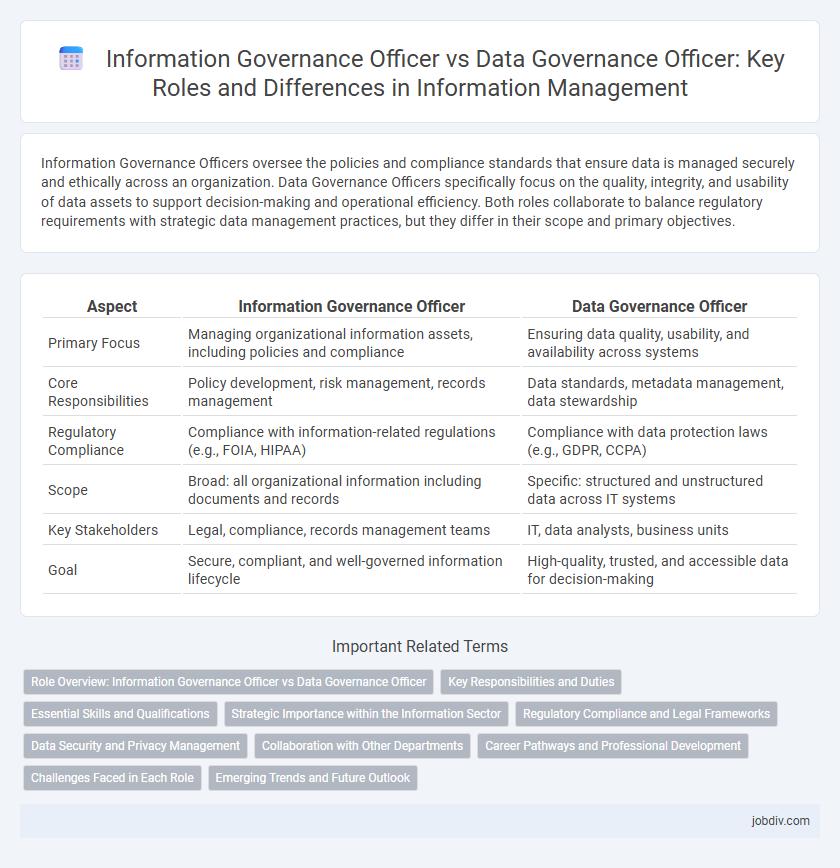Information Governance Officers oversee the policies and compliance standards that ensure data is managed securely and ethically across an organization. Data Governance Officers specifically focus on the quality, integrity, and usability of data assets to support decision-making and operational efficiency. Both roles collaborate to balance regulatory requirements with strategic data management practices, but they differ in their scope and primary objectives.
Table of Comparison
| Aspect | Information Governance Officer | Data Governance Officer |
|---|---|---|
| Primary Focus | Managing organizational information assets, including policies and compliance | Ensuring data quality, usability, and availability across systems |
| Core Responsibilities | Policy development, risk management, records management | Data standards, metadata management, data stewardship |
| Regulatory Compliance | Compliance with information-related regulations (e.g., FOIA, HIPAA) | Compliance with data protection laws (e.g., GDPR, CCPA) |
| Scope | Broad: all organizational information including documents and records | Specific: structured and unstructured data across IT systems |
| Key Stakeholders | Legal, compliance, records management teams | IT, data analysts, business units |
| Goal | Secure, compliant, and well-governed information lifecycle | High-quality, trusted, and accessible data for decision-making |
Role Overview: Information Governance Officer vs Data Governance Officer
An Information Governance Officer oversees policies and compliance related to the management, security, and privacy of organizational information across all formats. A Data Governance Officer focuses specifically on managing data quality, data lifecycle, and ensuring data integrity and usability within databases and analytics systems. Both roles require collaboration with IT, legal, and business units to align governance frameworks with regulatory requirements and corporate goals.
Key Responsibilities and Duties
Information Governance Officers oversee organizational policies to ensure data privacy, compliance, and risk management across all information assets. Data Governance Officers focus on establishing data quality standards, metadata management, and stewardship to maintain accuracy, consistency, and usability of data across enterprise systems. Both roles collaborate to enforce regulatory compliance and optimize data utilization for strategic decision-making.
Essential Skills and Qualifications
An Information Governance Officer requires expertise in regulatory compliance, data privacy laws such as GDPR, and risk management to develop policies ensuring organizational data security. A Data Governance Officer focuses on data quality, metadata management, and data lifecycle frameworks, possessing strong skills in data architecture and analytics tools. Both roles demand proficiency in stakeholder communication, project management, and knowledge of relevant technologies like databases and information management systems.
Strategic Importance within the Information Sector
An Information Governance Officer ensures compliance, risk management, and data quality across organizational information assets, aligning policies with regulatory standards to safeguard information integrity. In contrast, a Data Governance Officer focuses on data stewardship, metadata management, and data lifecycle oversight to optimize data usability and strategic decision-making. Both roles are crucial for effective information governance, but the Information Governance Officer emphasizes regulatory alignment while the Data Governance Officer drives data strategy for competitive advantage.
Regulatory Compliance and Legal Frameworks
Information Governance Officers ensure organizational compliance with regulatory requirements and legal frameworks by developing policies that protect data privacy and manage records retention. Data Governance Officers focus on the quality, accuracy, and security of data assets, aligning data management practices with relevant laws such as GDPR, HIPAA, and CCPA. Both roles collaborate to mitigate risks by implementing controls that uphold regulatory compliance and enforce legal standards across data lifecycle management.
Data Security and Privacy Management
Data Governance Officers prioritize establishing policies and frameworks to ensure data quality, consistency, and accessibility, focusing heavily on data security protocols and regulatory compliance to protect sensitive information. Information Governance Officers manage broader information life cycles, implementing privacy management strategies that align with legal standards and mitigate risks associated with data misuse. Both roles collaborate to enforce robust data security controls and privacy measures, safeguarding organizational data assets against breaches and ensuring compliance with data protection laws like GDPR and CCPA.
Collaboration with Other Departments
Information Governance Officers collaborate closely with legal, compliance, and IT departments to ensure data policies align with regulatory requirements and organizational standards. Data Governance Officers work alongside business units, data stewards, and analytics teams to maintain data quality, consistency, and usability across enterprise systems. Both roles require strong cross-departmental communication to foster a culture of data accountability and secure information management.
Career Pathways and Professional Development
Information Governance Officers typically progress through roles in compliance, records management, or information security, emphasizing regulatory frameworks and policy implementation. Data Governance Officers often start with backgrounds in data management, analytics, or IT, focusing on data quality, stewardship, and metadata management. Both careers demand continuous professional development in emerging technologies, governance frameworks, and data protection laws to advance into senior leadership positions.
Challenges Faced in Each Role
Information Governance Officers face challenges such as ensuring compliance with regulatory requirements, managing data privacy risks, and establishing policies that align with organizational goals. Data Governance Officers often encounter difficulties in maintaining data quality, standardizing data definitions, and facilitating collaboration across departments to ensure data accuracy and accessibility. Both roles require navigating complex stakeholder interests while implementing frameworks that balance operational efficiency and risk management.
Emerging Trends and Future Outlook
Information Governance Officers are increasingly focusing on integrating artificial intelligence and machine learning to enhance compliance and risk management frameworks. Data Governance Officers are prioritizing the adoption of cloud-native solutions and real-time data quality monitoring to support dynamic business environments. Both roles are evolving to address growing regulatory demands, with a future outlook emphasizing automation and cross-functional collaboration for comprehensive data stewardship.
Information Governance Officer vs Data Governance Officer Infographic

 jobdiv.com
jobdiv.com